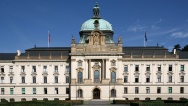Press Advisories
5. 11. 2019 17:20
In Prague, representatives of countries in the Friends of Cohesion group adopted a declaration, in which they refuse reductions in the cohesion policy
Representatives of countries in the Friends of Cohesion group, who were invited by the Czech Prime Minister Andrej Babiš to come to Prague for a discussion on the proposal of the multiannual financial framework of the European Union for the period 2021-2027, adopted a joint declaration (its complete wording), in which they declare their joint opinion on the proposal of the new EU budget for the next seven-year period. Out of the seventeen states participating in the summit, only Italy did not join the declaration. Italy is a net contributor into the European budget and is not a formal member of the Friends of Cohesion group. "It is a clear message for the other Member States and for the European Commission," said the Czech Prime Minister Andrej Babiš.
In the adopted declaration, the participating countries agreed that cohesion policy represented a key investment tool of the EU, which has contributed significantly and visibly to the real convergence of regions and Member States within the EU and to the functioning of the internal market. So that it can continue to help the weaker EU Member States to catch up with the stronger economies, as well as contribute to addressing new challenges such as climate change, industrial transformation or population ageing, cohesion policy must retain the volume of financing within the overall EU budget it had in the 2014-2020 period.
"For our citizens, it is a key investment tool of the European Union which significantly contributes to the transformation of the region. "It is the most important also for the Czech Republic - it is money for the construction of motorways, schools, nursery schools, for healthcare and other areas, which we really need and where we have a great debt in terms of investment," said Prime Minister Babiš.
A prerequisite for ensuring a smooth, efficient and effective implementation of the cohesion policy is flexibility in the phase of programming and implementation. Member countries of the Friends of Cohesion group therefore emphasise the necessity to give the member countries adequate discretion in spending the common European funding on projects they actually need with regard to the specific economic situation in the given Member State or region.
The meeting at the Prague Castle was attended by Prime Ministers or Government representatives of the Czech Republic, Bulgaria, Cyprus, Croatia, Estonia, Greece, Hungary, Italy, Latvia, Lithuania, Malta, Poland, Portugal, Romania, Slovakia, Slovenia and Spain. The European Commission that presented the current proposal of the new multiannual financial framework was represented by Commissioner for Budget and Human Resources, Günther Oettinger.
"The Commission proposal for cohesion, for investment, is 37 billion euros lower compared to the current period. I believe that we will find much more funding in the budget, which could be used better," said Prime Minister and specifically mentioned the budget rebates, i.e. discounts on payments into the common budget, that were introduced in 1984 on the motion of the then British Prime Minister Margaret Thatcher. The current Brexit is an opportunity to end that practice, in the opinion of the cohesion countries. "The rebates for the last year for five countries amounted to nearly nine billion euros and for the next period it should be 14.5 billion euros. It is a thing that does not make sense and it creates inequality among Member States," Andrej Babiš warned.
The session of the Friends of Cohesion group was framed by meetings of Prime Ministers of the Visegrad Four that is currently chaired by the Czech Republic. The main theme of the meetings of Prime Ministers of the Czech Republic, Slovakia, Poland and Hungary was cohesion policy, but the politicians also talked about climate protection, EU enlargement and other European topics.






